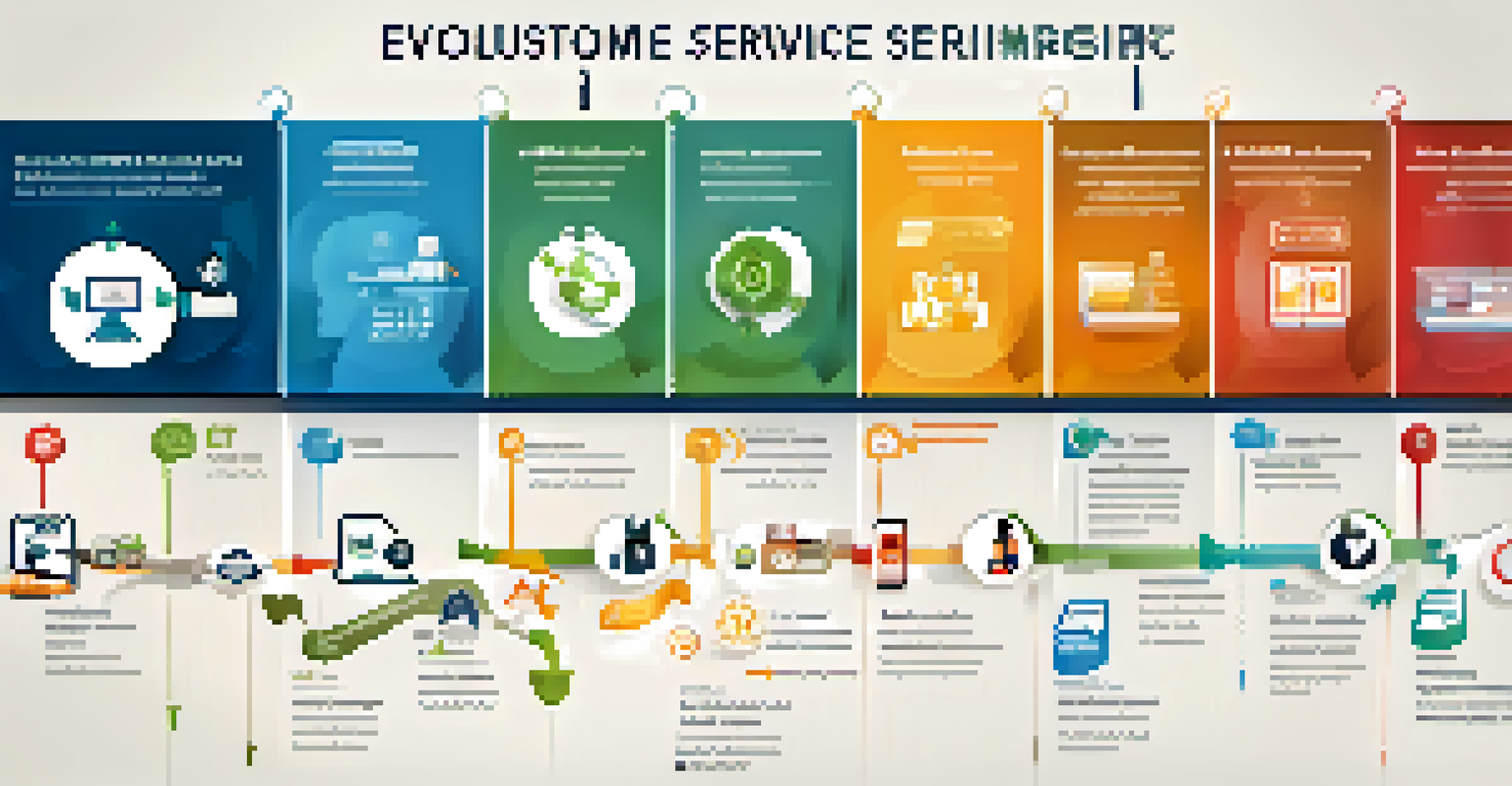AI and the Future of Customer Service Careers

Understanding AI's Role in Customer Service Today
Artificial Intelligence (AI) is no longer a futuristic concept; it's here and actively transforming customer service. Companies are leveraging AI to enhance customer interactions, streamline processes, and analyze data effectively. Chatbots and virtual assistants are becoming common tools, providing instant responses to customer inquiries and freeing human agents to tackle more complex issues.
The greatest danger in times of turbulence is not the turbulence; it is to act with yesterday's logic.
For example, imagine a customer reaching out to a company at midnight about a billing question. An AI chatbot can handle this inquiry immediately, ensuring the customer feels valued and supported, even outside of regular business hours. This not only improves customer satisfaction but also boosts operational efficiency, allowing human agents to focus on higher-level concerns.
As AI technology continues to evolve, its integration into customer service roles is expected to deepen. This shift raises intriguing questions about the future of these careers and the skills that will be in demand.
The Evolution of Customer Service Roles with AI
As AI takes on more routine tasks, the role of customer service agents is evolving. Instead of answering basic questions, agents are transitioning into more strategic roles that require critical thinking and problem-solving skills. This evolution means that customer service professionals will need to adapt by developing new competencies that complement AI technology.

For instance, agents might find themselves engaging in deeper interactions, such as resolving customer complaints or negotiating solutions, which require emotional intelligence and interpersonal skills. This shift highlights the importance of human connection in customer service, something AI cannot fully replicate.
AI Enhances Customer Service Roles
AI is transforming customer service by automating routine tasks and allowing agents to focus on strategic, complex interactions.
In this new landscape, customer service professionals who can leverage AI tools to enhance their performance will be in high demand, emphasizing the need for continuous learning and adaptation.
AI Enhancements: Improving Efficiency and Accuracy
AI brings a significant boost to the efficiency and accuracy of customer service operations. By analyzing vast amounts of data, AI can predict customer needs and preferences, enabling companies to offer personalized experiences. This means that when a customer contacts support, they can receive tailored solutions almost instantly.
AI is not just a tool; it can be a partner in enhancing human capabilities.
For example, if a customer frequently purchases a specific product, AI can proactively suggest related items based on their history and preferences. This not only enriches the customer experience but also drives additional sales for the company, creating a win-win situation.
The ability of AI to handle multiple inquiries simultaneously also reduces wait times and prevents customer frustration, ultimately leading to higher satisfaction rates.
The Skills Needed for Future Customer Service Careers
As AI becomes more integrated into customer service, the required skill set for professionals in this field is shifting. Critical thinking, empathy, and advanced communication skills are becoming increasingly important. While tech-savviness is essential, being able to interpret data and engage with customers on a human level is equally crucial.
Moreover, familiarity with AI tools and platforms will be a significant advantage for job seekers. Understanding how to work alongside AI systems will not only improve individual performance but also enhance team dynamics within customer service departments.
Skills Required for Future Agents
Customer service professionals will need a blend of technical skills and emotional intelligence to thrive alongside AI technologies.
In essence, customer service roles will demand a blend of technical know-how and soft skills, preparing professionals for a more dynamic and engaging work environment.
Challenges of AI in Customer Service: What to Consider
While AI offers numerous benefits, it also presents challenges that companies must navigate. One of the most significant concerns is ensuring that AI systems can adequately understand and respond to customer emotions and nuances. Misinterpretations can lead to frustrating experiences for customers, highlighting the need for balanced integration of human oversight.
Additionally, there is the risk of over-reliance on technology, which can alienate customers who prefer human interaction. Striking the right balance between AI automation and personal touch is essential for maintaining customer satisfaction and loyalty.
Addressing these challenges requires ongoing training and monitoring of AI systems, as well as regular feedback from customers to improve performance.
The Impact of AI on Customer Expectations
As AI-driven customer service becomes more prevalent, customer expectations are also evolving. Today's consumers expect instant responses and personalized interactions, thanks to their experiences with AI technologies. This shift means companies must continually innovate to meet these rising expectations.
For instance, if a customer receives quick and tailored support from an AI chatbot, they will likely expect the same level of service when interacting with a human agent. This creates pressure on businesses to enhance their customer service strategies, ensuring they remain competitive.
Evolving Customer Expectations
As AI becomes more prevalent, customers now expect instant, personalized responses, pushing companies to continuously innovate their service strategies.
Ultimately, understanding and adapting to these changing expectations will be crucial for success in the customer service landscape.
Future Trends: How AI Will Shape Customer Service Careers
Looking ahead, several trends indicate how AI will continue to shape customer service careers. One emerging trend is the rise of remote work, as AI tools enable teams to collaborate effectively from anywhere. This flexibility opens up opportunities for talent from diverse backgrounds, enriching the workforce.
Another trend is the increasing importance of data analytics in customer service roles. Professionals will need to harness data insights to drive decision-making and improve customer interactions. This analytical capability will become a core competency for future customer service agents.

Finally, as AI technology advances, roles focused on AI ethics and governance will emerge, ensuring that customer service practices remain fair and transparent. These trends signal a bright future for customer service careers, filled with opportunities for growth and innovation.